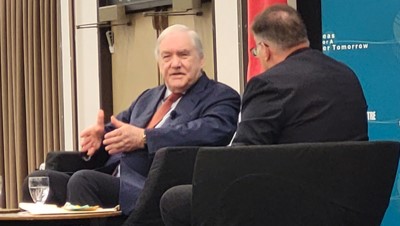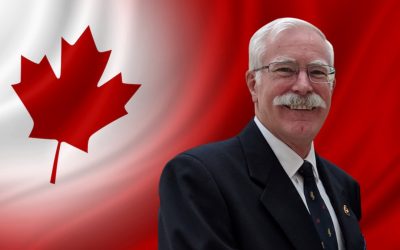Three hundred people filled the RBC Convention Centre in Winnipeg to hear Lord Conrad Black speak his mind.
Black told the Winnipeg crowd his parents lived in Winnipeg until the second World War and he still has first cousins living there.
“I know it’s not my city, but it’s not a foreign city exactly. It’s not like, with no disrespect, to, say, Edmonton, which I have no real connection with.”
Frontier Centre for Public Policy VP David Leis posed questions and comments to help the one-hour discussion along, calling Black a friend. He asked Black about the significance of Canada coming into being.
“I don’t think as a people we know our history. I think we have in some respects been … somewhat intimidated by our proximity to the United States. The fact is Canada had to begin as a French operation otherwise it would have just been assimilated into the American colonies,” Black said.
“We needed the protection of the British from the Americans. And by the skin of our teeth, we preserved Canada in the War of 1812.”
Black said the move for a sovereign Canada began 30 years before Confederation with some “drunk Scots” from Toronto and talkative Francophones who emphasized individual liberty. He said other European colonies also did well, despite being depicted unfavourably.
“The history we’re taught is this history of guilt and aggression and the evils of colonialism. By the way, colonialism, it had some evil. So, in general, the colonists left; places colonized became independent. They were in much better condition than when they arrived.”
Black praised the Frontier Centre’s book, From Truth Comes Reconciliation on residential schools.
“This is the greatest single contribution I know that any think tank has ever made to the enlightenment of this country,” Black said. He said the Frontier Centre rivaled the Fraser Institute in its intellectual contribution, but stood alone in its bravery.
He also condemned the narrative Canada committed genocide on indigenous peoples, and said bodies had not been found at residential schools.
“It’s utter fraud, this scandalous self-defamation, a kind of self-directed libel that our government has generated that Canada is somehow a nation of genocides. This is unbelievable.”
Black said groups like Amnesty International are wrong to compare Canadian history with that of the Nazi or Pol Pot regimes of the past.
“I’m not, as I said, not trying to defend everything we did, but to call it genocide? It was incompetence. It might even have been racial arrogance of a kind that was quite widespread in the colonial era. But almost nothing that we ever did with the native people was other than well intended.”
Black said the $27 million on ground-penetrating radar was poorly spent because the soil disturbances “could be just anomalies and roots and trees.”
He said not one body had been found, but “this satanic myth is far more convenient for the native victim than actually spending 1% of the money to do a little digging. You could do it with less than I had to pay people to dig out a cat that had fallen down a drain pipe in my house.”
The National Post founder called the Indian Act “rubbish” and thought the reserve system did not serve anyone well.
“In smallish communities like that the dark winter can be quite depressive, and that. We all are aware of these problems of alcoholism, high suicide rates, so we want to help them out … but we aren’t getting anywhere and in the billions and billions we pour out a lot of it is goes in, frankly, to corruption in some of the native officials,” he said.
“A lot of these places don’t have drinking water that you can be confident drinking, unless you boil it first. There’s no excuse for that with all the money we put into this, we just got to do it better. But, instead of sitting down with the native leaders … and working at something that’s fair and generous that we can all watch, grow and see proud of it, and be be happy for them, we’re defining reconciliation as slandering and libelling our own ancestors. Well, what kind of reconciliation is that?”
At Leis’ request, Black explained why he went to jail and the tutoring he did in prison. Black counted himself among one-fifth of people who were jailed who did not deserve to be there. However, the former lawyer and other bright minds started a tutoring program there. All 204 participants passed their courses, and 10 went on to achieve university degrees.
The experience gave Black a new appreciation for the value of education, something he believes needs reform.
“They have to get rid of collective bargaining among schoolteachers. I think the teachers’ unions are terribly retrograde. I certainly want good working conditions that encourage and incentivize good teaching, but I think the teachers unions are part of the problem,” he said.
“We have to address the fact that our universities are effectively unemployment deferral operations … I love university, I graduated from three universities, but in fields that are genuine fields, they weren’t gender studies. And … we need more people like plumbers and electricians.”
Black compared gender activists to “misbehaving children” who kept getting their way.
“It’s the lack of confidence of the leadership group. So, no one is prepared to say this is bunk and we’re not putting up with it any more,” Black said.
“I don’t mean uncaring or excessively autocratic leadership, I mean, plain speaking, and dealing with the facts. That’s what people want, they’re ready for it.”
Canada is not well-served by the Trudeau government, Black said. He said oil and gas are “our leading industry on which we’re in effect conducting war from the federal government. It’s a scandalous state of affairs.”
Asked how to turn the corner, Black replied, “A change of governments. I think it’s going to happen.” He said he’s known current Conservative leader Pierre Poilievre a long time and talked to him quite often.
“It’s the best leader of that party since Brian Mulroney was in office. He could be even better than that. I don’t know. But I think he’s awfully good, and we need him and I think he will win. And anything I can do, I will, I’ll do to help him,” Black said.
“This could be one of the world’s greatest countries. And it wouldn’t take more than five years of serious government before it was recognized as that. The world is ready for this, but are we ready for it? I say we are.”
Appeared originally here in the Western Standard Magazine, May 6, 2023



